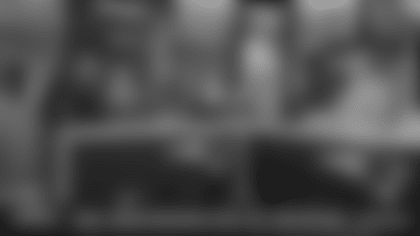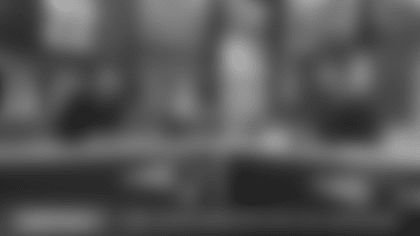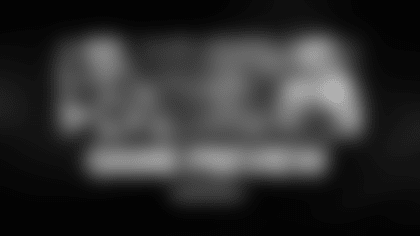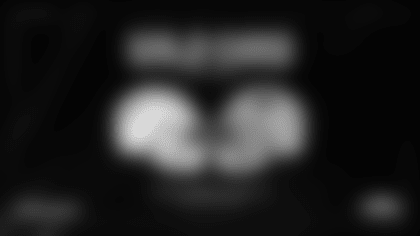Patriots director of player personnel Nick Caserio addresses the media during his conference call on Tuesday, November 24, 2009.
Q: How did Tully Banta-Cain change and/or develop as a player during his time in San Francisco?
NC: Well, I think when he was with San Francisco, they used him primarily on third and fourth down. They used him in some pass rushing situations, played him in the kicking game. He was playing in a rotational basis with some other guys out there. But when he was released, obviously, he's a guy we had some experience with. He had some production with us. One of things Tully has done since he's been here, going back to February or March, is he had a real strong offseason and he continued to work on his pass rush and develop some of those other skills. It has really translated over into the season. It's really a credit to Tully and what he's done. Really, it went back to, like I said, in March, with the offseason program and the OTA's [Organized Team Activities]. There was a steady progression and he's been productive when he's been on the field this year, there is no question about it.
Q: Is that work ethic something that he improved upon from his first stint with the Patriots?
NC: When he was here, he worked hard. We certainly did not have any issues with him when he was here. I really can't comment on what went on in San Francisco, but when he's been here, when he's been under our watch, he's done everything that we've asked him to do and he's responded favorably to the coaching, whether that's on the field or off the field. It's really a credit to Tully and what the coaches have done with him to this point.
Q: On David Thomas and what went into his trade and how he was valued...
NC: In Dave's situation, certainly we like him. We drafted him and he was productive when he was here. Anytime you go through, especially that time of year when you go through training camp, you have to make some decisions. And in the end you're going to make the decisions that you feel are best for the club. At that time, we went ahead and felt that it was the best opportunity for our club to do something, and then we went ahead and made the move. I think he's played well for the Saints and we've been happy with the production we've received from Ben [Watson] and Chris [Baker] to this point. So it's one of those things where you have to make some tough decisions and you wish you could keep everybody on the roster. But ultimately you just have to do what you feel is best for the club.
Q: Do you think you will see some extra effort from David Thomas on Monday night?
NC: That's probably something you can ask David. We'll show up and whoever they put on the field, then we'll play against them and that's what we'll do.
Q: Statistically, the offense has been less productive in the second half of games. Can you put a finger on what you've seen?
NC: I think it's a collective thing. It's hard to pinpoint any one thing in particular. Really, when you go in at half time, you make adjustments. The other club makes adjustments. Our job offensively is to go out there, and move the ball and score points. At different points, we've maybe had a little bit more success than others, and it's just important for us to keep pushing forward, keep grinding through it and to improve. Like I said, it's not one particular thing. It's a collective thing, whether it's a route here, a dropped ball here, maybe a missed block. So I think you're trying to eliminate collectively as a group some of those little things that may cause you to stall a little bit.
Q: How important is it go to be going forward to smooth that out and get some balanced scoring in the second half?
NC: Sure. In the end, our goal is to have more points on the scoreboard than the other club. Each week we go into it and we're expecting improvement on a week-to-week basis, whether it's the first half, whether it's the second half. Really, we've played OK at different points offensively, so I think the most important thing is being consistent for 60 minutes and finishing the game because you never know when that one play is going to sort of make the difference. Our philosophy in the first half is the same as it is in the second half. It comes down to executing a little bit better in the second half and making sure we are a little more consistent with what we're doing.
Q: Going through the season is in a sense a war of attrition in that you constantly lose players to injury. Do you wish it was more like baseball where you have the September call-up and ability to expand your rosters?
NC: From our perspective, what you try to do is manage the team as best as you possibly can given the constraints that you're given. Obviously, what we do in the NFL is different from Major League Baseball, so we just deal within the parameters that the league provides for us. You're right, absolutely. If you look at the Saints, they've had a few injuries come up at the cornerback position with Leigh Torrence being placed on IR [Injured Reserve]. They signed [Chris] McAllister last week. They went ahead and signed [Mike] McKenzie again today. Really you just try to manage the situation as best you can given the parameters the league has established. There's multiple avenues you can pursue. The notion of 'call-ups' — to use that term — to a degree, that is where your practice squad is involved. The reality is your roster is one through 61, if you include those eight players or however many players you have on the practice squad. They're eligible to play every week. So, you just have to manage the club and manage the team as best you can and deal with the injuries as they happen.
Q: But if you were to add maybe eight more to that figure so that you would have 61 [players] plus eight guys extra on your practice squad ...
NC: Sure, I understand what you're saying. That question is probably best served to be directed to the folks in New York and probably not myself. But we do what we can given the rules that are established.
Q: How valuable and versatile has Mark LeVoir been since he's been here?
NC: When we looked at Mark last preseason, he played both right and left tackle for the Rams. There's something to be said for that versatility. Sometimes you have guys that have a little more skill on the right side, but they can't play on the left side and vice versa. Or maybe he's a little bit more of a left tackle and really can't play on the right side. So the thing with Mark is having that versatility, there's value to your club. So in the event that the left tackle goes down, you can plug him in there, or if the right tackle goes down. Mark has come in and when he's been called upon, whether it was last year — I think he played two or three games in a row he started in place of Matt [Light] — he went in and he performed well. That versatility certainly adds value to your club and gives you some flexibility. And even the way we've used him offensively at tight end in some situations, whatever he's been called upon to do, he's gone in there and performed.
Q: Jonathan Wilhite, Leigh Bodden and Darius Butler are seeing the majority of playing time at cornerback. Yet if you add up their salaries, the sum is less than that of Shawn Springs. Does that demonstrate the difficulty when you are evaluating talent in the offseason?
NC: You're really trying to add as many good players at the position as you can. When you bring them in, when you draft them, when you sign them, they go out there and they compete for their spot. It's a competitive group. At different points, at different times, they've been on the field together. They've been on the field at separate times. You bring the players in. You put them on your roster. You put them on the field. Then, they go out and compete for their spots. There are some packages where there are more of them that are out there than others. When you evaluate the player, you evaluate the guy's skill and all four of those players you mentioned, we're happy with them. We saw the skills that were important to play the position and we feel confident whenever those players are on the field. So however it shakes out, that's how it shakes out.







































